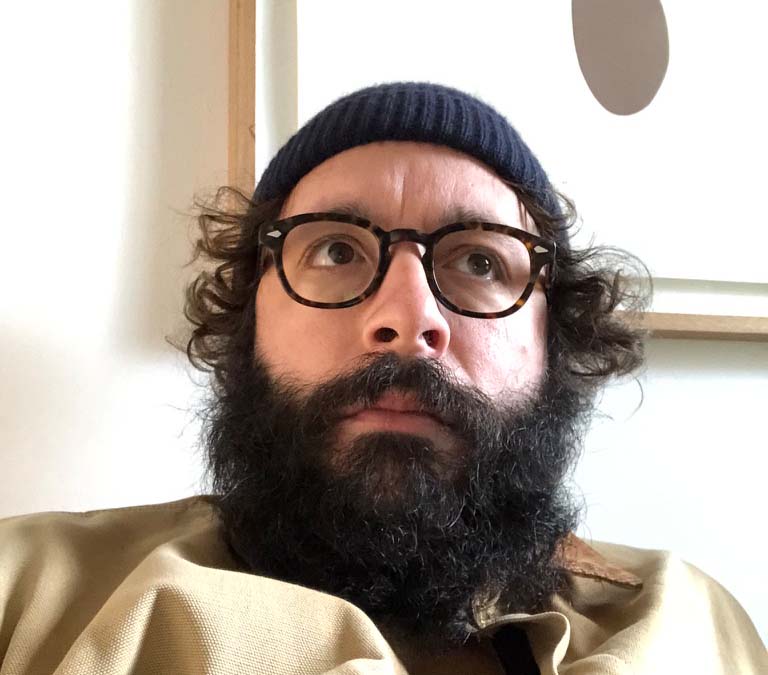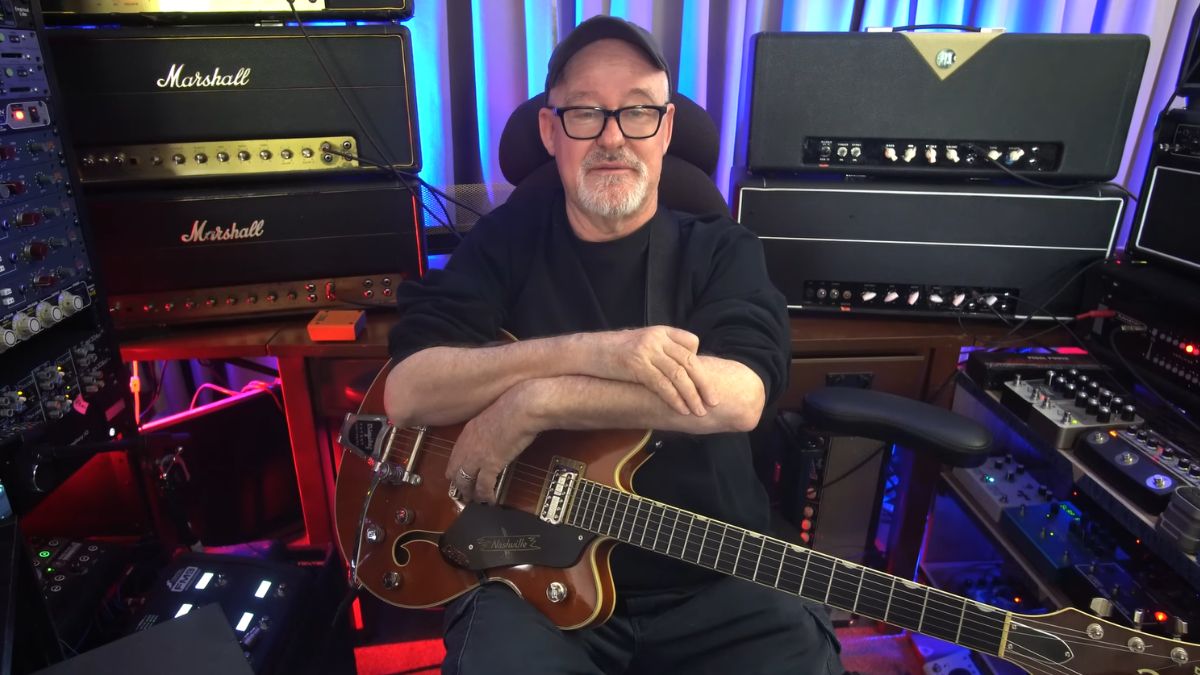Kim McAuliffe on the riotous story of Girlschool: “I got electrocuted onstage, nearly died, and the rest of them went back and had a massive party!”
Pigs’ heads, electrocution, high volume – how Girlschool put a little danger into rock ’n’ roll
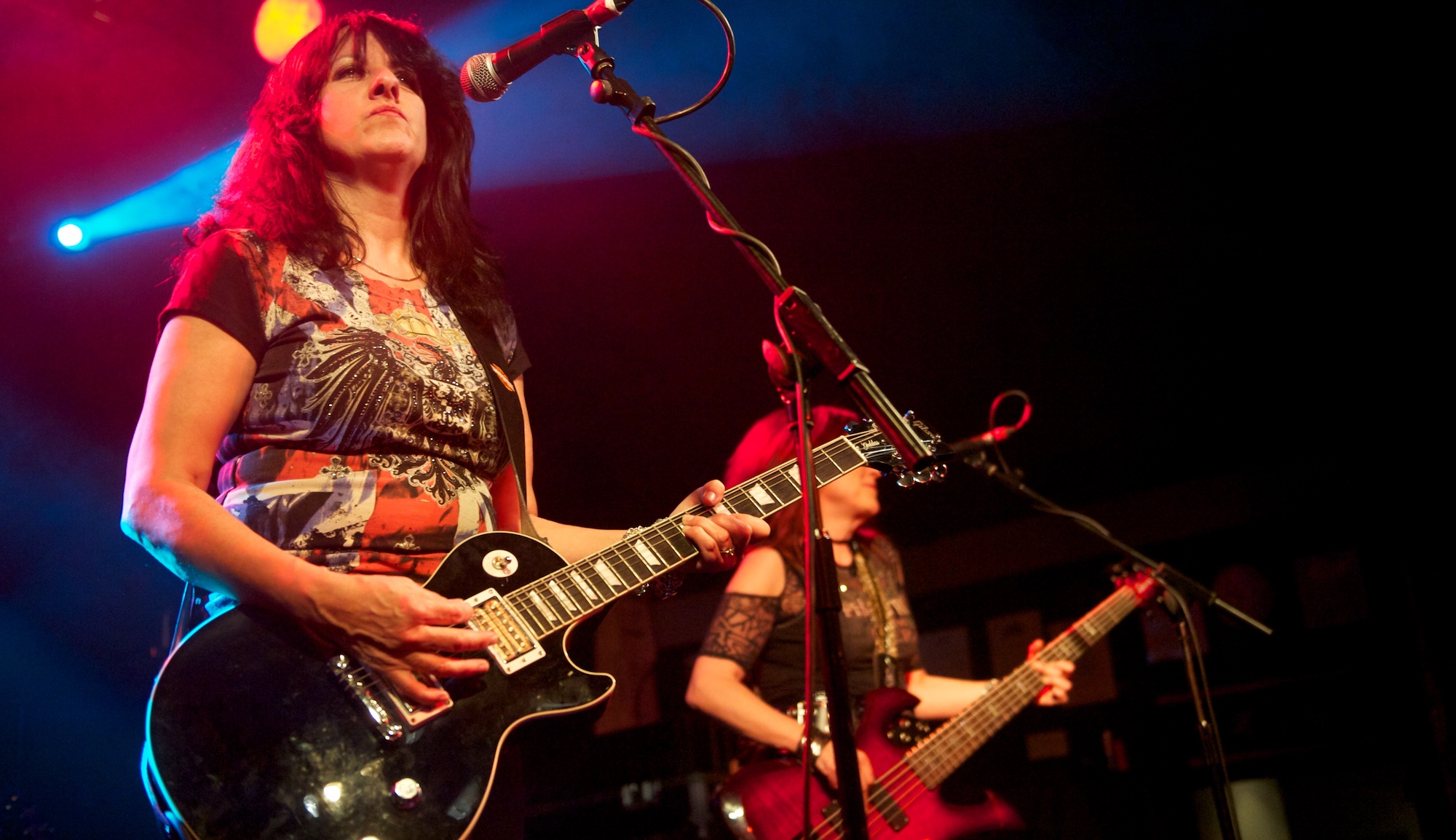
Too metal for the punks, too punk for the metalheads, Girlschool became a rock ’n’ roll institution unto themselves. Their sound was engineered through simple arithmetic: Gibson guitars plus Marshall guitar amps times volume and energy – lots of energy.
Formed in London in 1978 after a few years playing under the name Painted Lady, Girlschool were free radicals that came out of Britain’s chaotic punk scene, cohabiting with the likes of the U.K. Subs, but they had a sound and an image that endeared them to the nascent NWOBHM (New wave of British heavy metal) scene.
That they were all female made it all seem a little bit more dangerous, upending the natural order of the boys club – but as guitarist/frontwoman and founding member Kim McAuliffe recalls, there was a lot of danger in those days.
Armed with her Gold Top and an insouciance as chaos erupted around her, lead guitarist Kelly Johnson – who passed away in 2007 – cut an iconic figure, and was a perfect foil for McAuliffe’s hard rock rhythms.
With their first four albums reissued on vinyl through Renaissance Records, this was an opportunity to look back on the Girlschool phenomenon, and how they found a sense of creative kinship with Motörhead, who they would tour with, drink with, and – billed as Headgirl – collaborate with on a cover of Johnny Kidd and the Pirates’ Please Don’t Touch.
The sight of both sharing a stage on Top Of The Pops would have terrified any hotelier foolish enough to take their booking, but so too any rock band coming out then. That was the standard to which others had to reach. Most would be found wanting.
But this was just Girlschool’s high-energy M.O. To paraphrase their old pal Lemmy Kilmister: they are Girlschool, and they play rock ’n’ roll.
All the latest guitar news, interviews, lessons, reviews, deals and more, direct to your inbox!
How did you start on guitar?
“It was my cousin. I blame him. I was an only child, and my cousin was an only child, and we lived literally next door to each other, so I sort of grew up with him as a brother. He was a couple of years older than me. We grew up really close.
"I was into music from day one. In our house it was always the Rolling Stones, the Beatles, everything like that, and then of course as I got a bit older I started listening to all sorts of stuff, the glam rock, the heavy rock.
“Then, of course, my cousin was always one step ahead of me, because he was a couple years older. I'll never forget when he started to play me heavy rock stuff like Deep Purple, all this business, and then he got a guitar – an electric guitar.
We had no choice but to find out other girls that were interested. That’s how the band started
"We always had acoustic guitars that we were mucking around on, but he got an electric guitar, a Rapier 33. I'll never forget it. It was a Rapier 33, bright red, and I remember my Mum and Dad saying to me, ‘Don’t you get any bloody ideas!’ – jokingly. Anyway, next year, I had it! [Laughs] Because he went on to get a better one and it was handed down to me. That’s how it all started.”
You need someone to open that door when you are younger…
“Yeah, but the thing was, he held me back as well! He is not going to take all the credit because me and Enid lived on the same street. Enid was literally like 10 doors away from me, and her brother played guitar as well. He’s a brilliant jazz guitarist, so she had always seen her brother play.
"I literally went across and knocked on the door and said, ‘Let’s do a band. Come on! Let’s do a band. How about you play bass, I’ll play guitar?’ She said, ‘Yeah, all right!’ And that was it. My cousin, Lee, he had a band, but they were all blokes – they didn’t want to know. They didn’t want to know about girls. No way. We had no choice but to find out other girls that were interested. That’s how the band started.”
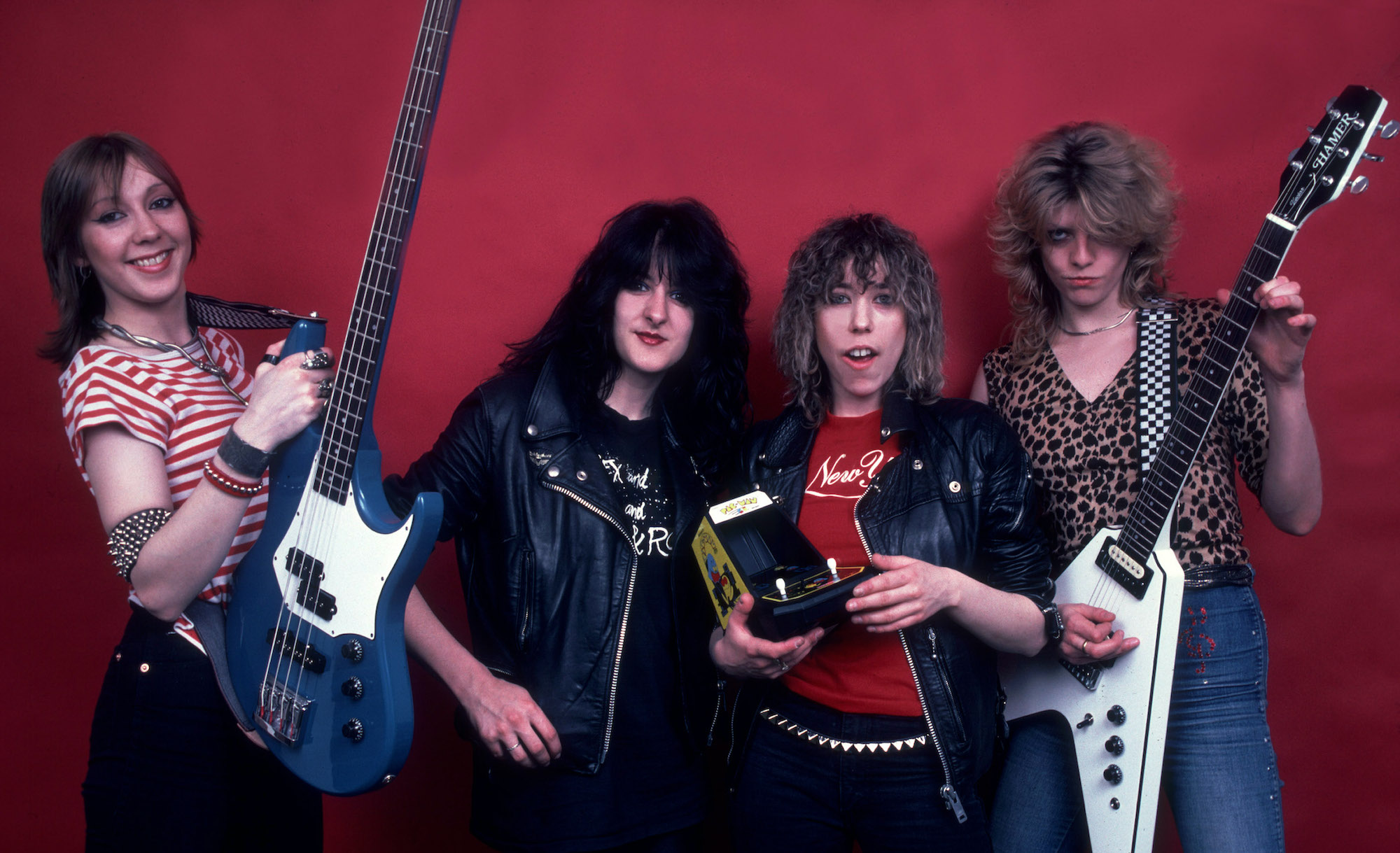
Did you get lessons?
“No, I went to a couple of guitar lessons with a guy in Surbiton. I used to lug my guitar up there, get on the train up to Surbiton, but only for a couple of times. It didn’t seem right with lessons.
"He was teaching me all the scales and things, and I’m thinking, ‘Well, okay, not really what I am into.’ To tell the truth, I can only play about three chords now! But, y’know, I am happy to say that the three chords I play are okay. [Laughs]”
Well, how many more do you need?
“[Laughs] I know! Well, I play a few more, but I am a rhythm guitarist; I leave all the widdly-diddly to Jackie [Chambers].”
It’s rock ’n’ roll, though, and that’s all about the rhythm guitar.
“Well, I am quite proud to say that Vic Maile, our lovely producer, he always used to say that my little thing in the background made it. I’m not lying! That’s what he said.”
When you formed Girlschool, you went on tour almost immediately didn’t you?
“People seemed to think that we met Motörhead and it all just happened, but we had been going for years before that, with Painted Lady, with a fantastic guitarist called Deirdre Cartwright. She did so much for women in rock and music in general. She was just amazing, absolutely amazing.
"What happened was, we started this band, and no blokes wanted to play with us in the first place so we had no choice but to find other women who were interested, and through friends of friends of friends, we met Tina [Gayle], our drummer in Painted Lady, then through someone else we met Deirdre. Because she was so amazing, she elevated us to a state where we could actually play gigs, because she was so bloody good.
“She was more of a teacher than any other teacher I could have found. She would encourage us, help us. We were able to play gigs, and Painted Lady – dreadful name, now I think of it! [Laughs] – we had residencies in two pubs, even though we were too bloody young. We were only 16 or something, I can’t remember now, but we got lots of attention.
"We had a residency in Tooting, at The Castle, and another one at the Two Brewers in Clapham. And we were so young! It was nuts when you think about it, and then we had the Daily Mail come down, and wrote, ‘Enid Williams, aged 16, downs half a pint of Guinness…’ [Laughs] That was amazing.
“Then Deirdre, quite rightly, said she had had enough. She wanted to go and do other things. She couldn’t really carry on doing this, but then, through friends, we found Kelly [Johnson]. And Denise [Dufort, drums], she lived in Clapham – she used to come and see us anyway – and that’s how it all happened. We became Girlschool.”
Playing those shows, having residencies must have taught you a lot of things, not least how to handle a crowd, and in those days quite a scary crowd.
“I don’t know. We didn’t really think about it. My Dad used to drive us in the van, Kelly’s dad helped out and Enid’s family helped out. It was like a family affair. Oh God, it was so long ago! [Laughs]”
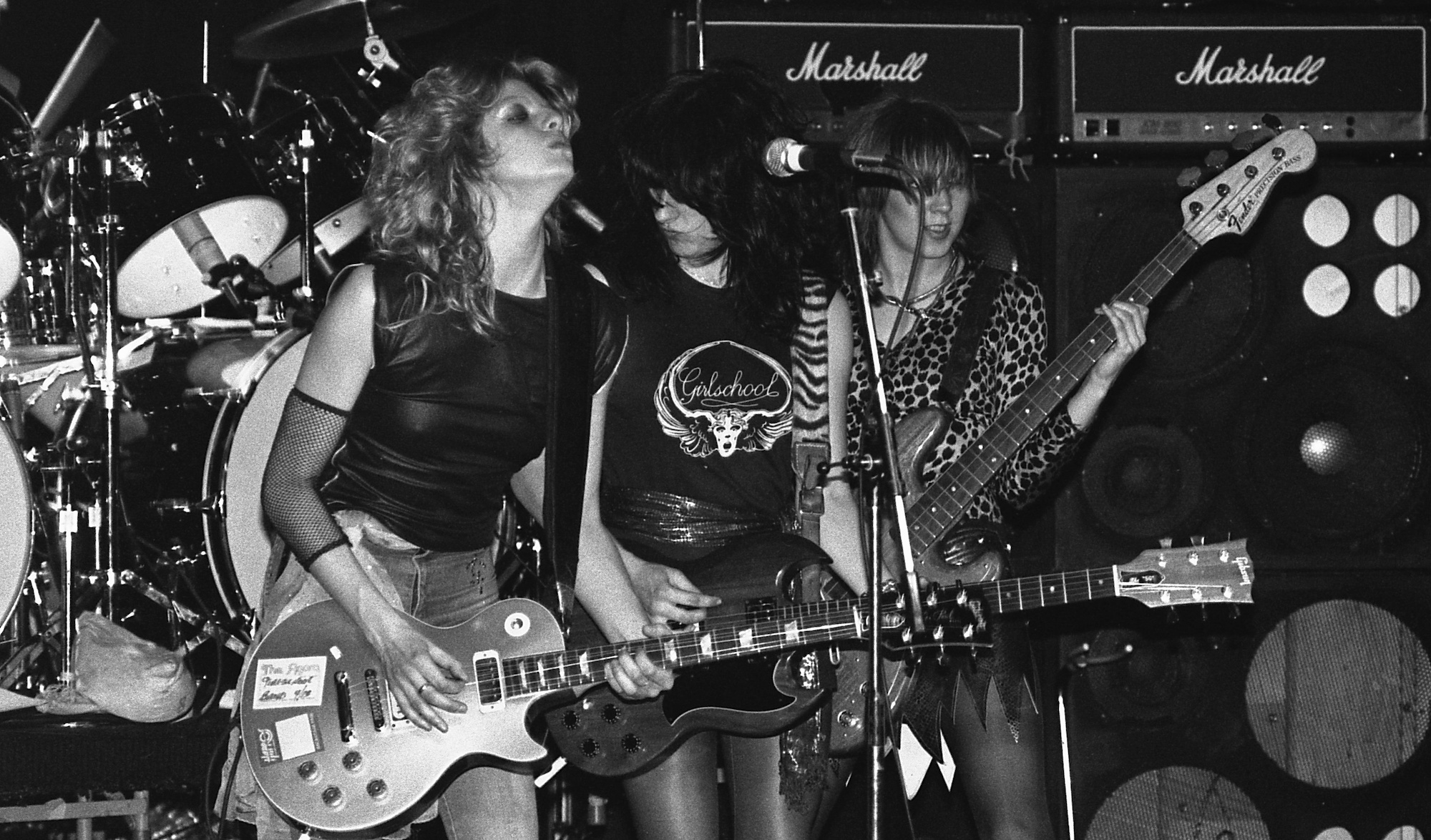
But it’s amazing. It was a pure rock ’n’ roll story, and you were the classic too punk for metal, too metal for punk band.
“That’s what happened when we became Girlschool. Because with Painted Lady, we would just do covers. We were a cover band. But then we decided, ‘This is good!’ We had something really good going on, and that’s when we started to write our own songs, and of course we were stuck in the middle.
"We would play heavy metal gigs and they would think we were punks, and then we would play punk gigs and they’d think we were heavy metal. I’ll never forget, but God knows why, we were put on with Sham 69 at the Hackney Empire. [Laughs] Were just being booed at! It was so funny. We thought it was hilarious.
"Kelly, she was so cool, she stood at the side of the stage, smoking a fag, saying F’ you lot basically. I’ll never forget the end of the night; it was trashed. They trashed the place. It is quite sad now, thinking about it.
“Our best mates were the U.K. Subs. We even used to share a flat with some of the members of the U.K. Subs, and they were punks, so that’s how we got our first single [Take It All Away]. It was all down to the bloody youth club, and City Records, with Phil [Scott]. Phil said, ‘Oh, do you fancy doing one?’ And we said, ‘Of course we do!’ We were right in there with the punk thing.”
Those punk gigs must have been crazy.
“Blimey! One gig, I have never seen anything like it. There was stuff flying everywhere, police – it was like the Wild West!”
It is funny, because gigs used to be a little more dangerous. Even throughout the '80s. People nowadays might not appreciate quite the sort of lawlessness that these gigs were. Punk was banned in some towns. Were you conscious of that sort of rebelliousness?
“Anything was allowed to happen, it seemed. Then, at the end, clear it all up. It was crazy. I don’t know, but I will never forget that U.K. Subs gig. I will never forget it. We were just excited to see our mates and there were chairs flying, things going everywhere! [Laughs] It was nuts, and nobody stopped it.”
Girlschool gigs weren’t safe spaces. You got electrocuted onstage.
“I know I’ve said this before but I want to put this in again, when I got electrocuted onstage, and nearly died, the rest of them went back and had a massive party! [Laughs] I said to them, ‘Don’t you leave me. You better come get me in the morning.’ They didn’t turn up until one o’clock in the afternoon because they were too bloody hungover.
"The weirdest thing was, I actually saw myself. I literally went out of my body. I saw everything that was going on. They said, ‘You couldn’t have seen it – you were flat on your back.’ But I did.”
Can you talk a little bit about signing with Bronze Records, and how important that deal was?
“Well, we had that single out on the little independent label, City Records, and then John Peel played it. This is the weirdest thing – we all thought, ‘Yeah, we’re gonna do a single. It’s going to be glamorous, in this lovely recording studio.’ And there we are, downstairs in this dingy little basement in Soho, really. It was horrible.
"It was a really dingy and dark basement, for all of four hours, and as we were coming out into the sunlight upstairs John Peel was just standing there at the top of the bloody stairs! ‘Peel! Hello! We’ve just done a single.’ ‘Okay, I’ll have a listen.’ And he did play it. He said, ‘Well, it’s normally my type of thing.’ And we were all tuned in, listening – ‘This is by four girls I met down by Tottenham Court Road.’
"I think we sold something stupid like seven thousand of those singles, which was unheard of in those days – even now! You can’t sell amounts like that now.
“Anyway, that got the attention of Lemmy and the management [of Motörhead] who at that point were looking to do their first major tour, the Overkill tour, and they wanted a support band. They thought, ‘Check them out!’”
You were well suited. Because you were both misfits.
“Yeah, exactly! I think that's why we clicked. The weirdest thing – talk about serendipity – was, about six months before, my mum had a friend who used to work in the business, at a record company, and he used to give us albums and whatever, and he ended up giving us the 10” of the original Motörhead EP.
"This EP just turned up in our lives. Me and Kelly were sharing a place at my mum and dad’s place, and then we had this EP – you know, with the black and white cover – and we both looked at it and thought, ‘Oh my God!’ They looked frightening, and then we listened to it, and it was incredible. It was a bit like us! And then months later, we get the call asking if we wanted to support them.”
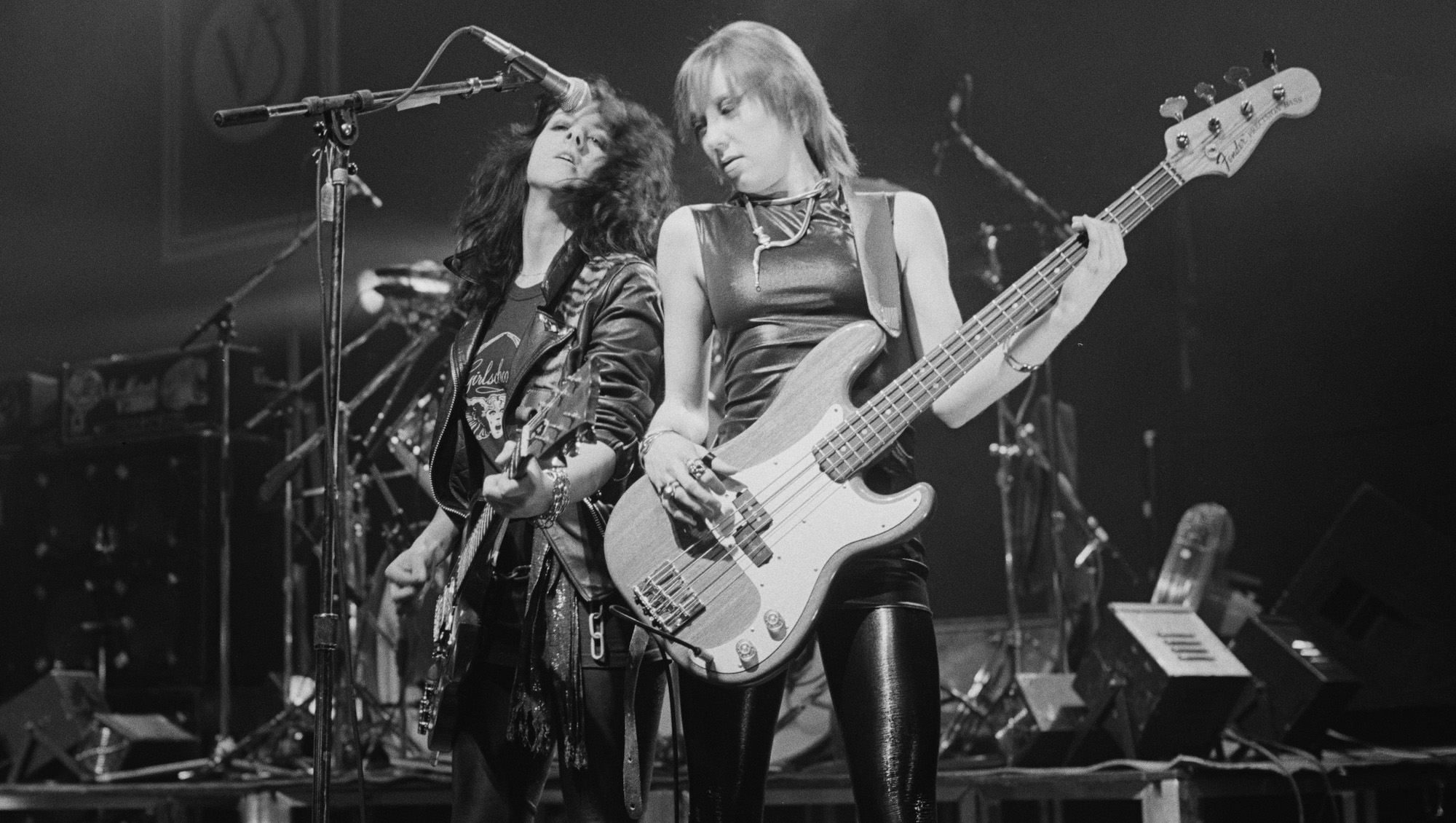
People look back at Motörhead and Lemmy as an institution, but we have to remember that no one knew them either back then. What do you remember from that tour?
“I don’t remember that much! [Laughs] I do remember how brilliant it was. You have to understand, before this tour, we were literally touring all over Europe in the back of a bloody van that we stole from my mum and dad.
"Living on top of our gear in the back of a bloody van, no money, just literally doing all that before Motörhead came along. It wasn’t like they came along and suddenly changed our lives. We were already doing it.
Lemmy thought it would be fun to put half a pig’s head in the guitar case. We screamed our heads off before we went onstage
“After we had the introduction with Lemmy and all the rest of it, we clicked. It was brilliant. We were sharing a tour bus with them. They hadn’t done a big tour like that either, and the fans just took to us. It was incredible. The two bands worked so well together. And partied. Oh, when I look back now I think, ‘How the hell did we do that and get up the next day and play a gig?’
"I mean, I remember one morning, knocking on Lemmy’s door, and I said, ‘Blimey, you’re up early.’ He said, ‘I haven’t been to bed yet!’ We had such a laugh. And the poor maid – the state of the room.
“But it was absolutely nuts, absolutely nuts. I know I've told this story a million times about the pig’s head in the guitar case, but oh my God! Lemmy thought it would be fun to put half a pig’s head in the guitar case. We screamed our heads off before we went onstage.”
Those gigs must have been something.
“They were incredible, absolutely incredible. I’d never heard anything like it.”
Thereafter, it gets serious, because then you are in the studio with Vic, Jackson Studios, just within the M25.
“Yeah, in the middle of bloody nowhere! [Laughs] It literally was a shack. It wasn’t glamorous at all. It was really basic. There was nowhere to get hot food. We had to live on Marmite sandwiches. But that’s where Vic was working and he knew the sound. He knew everything there and that suited him.”
Did you learn a lot from Vic? He knew his stuff.
“The thing about Vic was he worked on feel. That was how he worked. He didn’t particularly care about the sound – well he did care about the sound but the main thing was the feel, if something felt right. I learnt a lot about that, and he was brilliant, absolutely brilliant. We would be sitting there and Kelly would be doing her solos and Vic would go, ‘Yes, go! Wargh!’ It was all about the feel – the drumming, everything.
"He used to sit there, and of course, this was the old days, no computerized stuff; this was all hands-on. We used sit there, me and Denise, and he’d go, ‘Push that one up now!’ And we’d be going, ‘What do we do!?’ It was all tape. Sometimes we would edit it and he’d chop the tape. It was really amazing, though, because I think that’s how it felt so real and sounded so good.
"Also, we played live. We didn’t do what people would do today, where you do one track, one track, one track – we were actually playing live, and then we would add on a few bits, like percussion. Vic loved his percussion. Again, on Ace of Spades, you can hear all of that going on there.”
Vic’s thing about feel was crucial because you can hear the energy.
“Yeah, exactly, that’s what it was. The whole thing was energy! These days, a lot that is lost.”
Do you remember what guitars and amplifiers you were playing through?
“It was always Marshall. Always. And I have always loved Gibson. I used to play SGs. I have still got them, and I am lucky enough to actually own Goddess Les Pauls, which they don’t make anymore, and I think that’s an absolute crime because they were made for girls.
"They were girlie Les Pauls, basically, scaled-down. They were beautiful – even the blokes I’ve been on tour with would be like, ‘What’s that!?’ I have got a purple one and a black one, and they are my favorites at the moment.
“But I have more – my other half, he does his nut sometimes. [Laughs] ’What are you going to do with all these guitars when you peg out?’ And I’ll say, ‘Well you’re going to have to sort them all out!’ Because I do have quite a few now. I’ve got an Epiphone SG that Lips [Steve Kudlow, Anvil vocalist] gave me, which was lovely of him. I’ve even got the first bloody Shergold that I used to have. That goes back to Painted Lady.”
Did you not use some Tele-style ESP guitars, too?
“Oh yeah! When I went to Japan – when we were big in Japan – they literally said, ‘Choose whatever you want.’ So I got that black one, which I auctioned for charity and made one-and-a-half grand for the Essex Air Ambulance. We all signed it. Lemmy signed it. I loved that guitar but it didn’t really work any more.”
Which Marshalls did you use back then?
“JCM600s, I think. Or the 800s. Funnily enough, I’ve still got the old ones in the shed.”
Have you been playing a Dean Soltero more recently?
“Dean were lovely enough to give me one. They’re lovely guitars as well. Jackie uses a Dean as well but she uses one she got made for her. Funnily, enough, I’m looking at a Dean guitar right now. It’s an SG-type that I’m using to write songs.
"I’ve got another songwriting session coming up. We have started writing with a woman from Thundermother. But me and Jackie have about five songs that I think are okay. But we’ve got to take this seriously because it will probably be the last one. It’s got to be good.”
Are you a collector?
“Oh no, I just pick them up. Then I don’t know what to do with them. Even the Shergold – blimey! I’ve had that since I was 16.”
Back to the Girlschool catalog, what do you remember about Screaming Blue Murder? You worked with Nigel Gray in the studio.
“It was totally different to Vic. In a way, I wish we hadn’t left Vic, but it came down to money because Vic was quite expensive by then. I think they did a deal with Nigel. We had Gil [Weston, bass] come in on that one and we knocked that album out in three weeks, literally.
"It was fun, and mad, totally energetic. Again, it was the energy. Nigel had worked with the punk people, and it was fun. I still like some of the songs on there. It was rock ’n’ roll. We have always been rock ’n’ roll. That’s what we are – a rock ’n’ roll band.”
If you want to know where a band is coming from, often the covers give it away, and you covered the Stones, ZZ Top’s Tush...
“We always tried to do a cover on each album that meant something to us, and [the Stones’] Live With Me, I just love that song, it has such a brilliant bass line and we just rocked it up. And, of course, on our last album we did the Bee Gees’ Staying Alive, which I love!
"I love the Bee Gees and I don’t care what anyone else thinks. Saturday Night Fever, I remember going to see that at the cinema and thinking it was one of the best things I have ever seen.”
There is a thread between rock and disco, though. It’s in the beat, the rhythm, and also youth culture and rebellion. And that’s kid of what Girlschool is about anyway.
“I hope so. I can’t believe we are still doing it. I’m quite proud of us. I must admit.”
- Demolition, Hit and Run, Screaming Blue Murder and Play Dirty are available now as vinyl reissues via Renaissance Records.
Jonathan Horsley has been writing about guitars since 2005, playing them since 1990, and regularly contributes to publications including Guitar World, MusicRadar and Total Guitar. He uses Jazz III nylon picks, 10s during the week, 9s at the weekend, and shamefully still struggles with rhythm figure one of Van Halen’s Panama.
